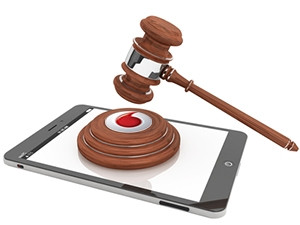
South Africa's number one mobile operator, Vodacom, has dismissed allegations it infringed the intellectual property (IP) of Ndabenhle Business Enterprises over its "Airtime Advance" product.
In a fresh lawsuit set to be heard at the South Gauteng High Court in Johannesburg next month, Ndabenhle Business Enterprises, owned by businessman John Khaba, is demanding compensation from Vodacom, accusing it of misappropriating his idea of Airtime Advance and launching it as its own in 2011.
The businessman is demanding five cents of every rand the cellphone giant made from Airtime Advance.
In a move that was meant to offer customers products to keep them loyal, Vodacom launched Airtime Advance in 2011. The feature allows customers to get a R10 airtime advance when they run out. However, they need to pay an additional R1 the next time they recharge.
Within a month of its launch, the product had over one million subscribers.
No facts
Responding to ITWeb, a Vodacom spokesperson said: "Vodacom can confirm that Ndabenhle Business Enterprises has, indeed, initiated a High Court action against Vodacom claiming that a product we launched, Airtime Advance, is its idea.
"Vodacom is defending this action and is seeking a dismissal of the case on the ground that the plaintiff's particulars of claim do not disclose a cause of action. The claim is not supported by facts and pertinent evidence."
Khaba claims he approached Vodacom with the airtime advance idea a year before it launched the product to alleviate problems experienced by operators. The 57-year-old claims he offered to buy additional prepaid airtime in bulk for operators of Vodacom's cellphone containers in townships on credit, which they would later repay, with Khaba getting five cents for every rand advanced to operators by Vodacom.
Khaba, through his company, proposed that his customers would pay back the airtime he advanced with Vodacom's fee and it would then pay him the whole amount of any airtime advanced to them.
He claims he proposed the idea to Vodacom's then chief operations officer Vuyani Jarana on 6 April 2010.
The fresh lawsuit comes as Vodacom is still embroiled in a similar court case with former employee Kenneth Nkosana Makate, who claims to have invented the 'Please Call Me' service.
In this protracted case, Makate took Vodacom to court in 2008 in an attempt to get compensation for the 'Please Call Me' service, which he claims he invented in 2000 while working for Vodacom as a junior accountant. He says the concept arose when he was not sure whether a then-girlfriend was out of airtime, or avoiding him.
The case is now at the Constitutional Court which has since reserved judgement.
No protection
Stephen Hollis, senior associate and IP attorney at Adams & Adams, says the difficulty a plaintiff may face in a case where a claim is made that another party "stole their idea" is that there is generally is no legal protection in an idea in itself.
To achieve success in such a case, he notes the plaintiff may have the onus of proving the other party is in breach of a contractual obligation or other legal duty - for instance, to respect the confidentiality of the disclosure of information that occurred.
In terms of SA's copyright legislation, for instance, statutory protection is afforded to the author or creator of certain works that are specifically defined in the Act - such as literary works, musical works, artistic works, computer programs, etc - but only once that work is original and reduced to material form, Hollis says.
In terms of South African law, agreements need not be in writing, Hollis points out, adding it can also be oral or inferred through conduct.
"Of course, it is not always easy to prove the existence of a contractual undertaking or agreement if it is not in writing and signed by both parties. If you have a great idea and you are pitching it to any business, it is very important that you consult with a lawyer and ensure you cover yourself contractually insofar as possible to avoid future disputes arising," he concludes.
Share